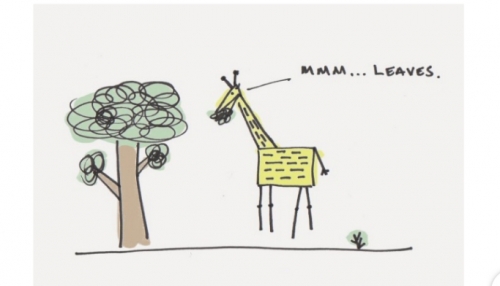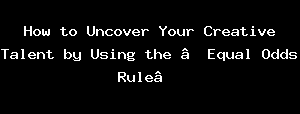profile/5819Screenshot_20200808-231425.png
SamuelOz

The Evolution Of Anxiety: Why We Worry And What To Do About It
~1.9 mins read
Let’s pretend for a moment that you are a giraffe.
You live on the grasslands of the African savanna. You have a neck that is 7 feet long (2.1 meters). Every now and then, you spot a group of humans driving around on a safari taking pictures of you.
But it’s not just your neck and their cameras that separates you from the humans. Perhaps the biggest difference between you and your giraffe friends and the humans taking your picture is that nearly every decision you make provides an immediate benefit to your life.
When you are hungry, you walk over and munch on a tree.
When a storm rolls across the plains, you take shelter under the brush.
When you spot a lion stalking you and your friends, you run away.
On any given day, most of your choices as a giraffe—like what to eat or where to sleep or when to avoid a predator—make an immediate impact on your life.You are constantly focused on the present or the very near future. You live in what scientists call an immediate-return environment because your actions instantly deliver clear and immediate outcomes.
The Delayed Return Environment
Now, let’s flip the script and pretend you are one of the humans vacationing on safari. Unlike the giraffe, humans live in what researchers call a Delayed Return Environment.
Most of the choices you make today will not benefit you immediately. If you do a good job at work today, you'll get a paycheck in a few weeks. If you save money now, you'll have enough for retirement later. Many aspects of modern society are designed to delay rewards until some point in the future.
This is true of our problems as well. While a giraffe is worried about immediate problems like avoiding lions and seeking shelter from a storm, many of the problems humans worry about are problems of the future.
For example, while bouncing around the savanna in your Jeep, you might think, “This safari has been a lot of fun. It would be cool to work as a park ranger and see giraffes every day. Speaking of work, is it time for a career change? Am I really doing the work I was meant to do? Should I change jobs?â€
Unfortunately, living in a Delayed Return Environment tends to lead to chronic stress and anxiety for humans. Why? Because your brain wasn't designed to solve the problems of a Delayed Return Environment.
profile/5819Screenshot_20200808-231425.png
SamuelOz

How To Uncover Your Creative Talent By Using The Equal Odds Rule
~2.9 mins read
Paul Erdos was a strange man. He lived out of two suitcases, never learned how to cook his own meals, worked up to 19 hours per day, took amphetamines daily and washed them down with caffeine, and gave away nearly all of the money that he earned.
Erdos was also the most prolific mathematician of the 20th century. He wrote or co-authored over 1,500 mathematical articles during his career and partnered with over 500 different collaborators. As you would expect, his contributions to mathematics were significant.
Erdos solved a variety of difficult problems. He worked out a proof for the prime number theorem. He led the development of Ramsey theory. He discovered the proof for a difficult mathematical riddle known as Bertrand's postulate. Long story short, Erdos was good. He worked his tail off and advanced the field of mathematics because of it.
And yet, do you know what became of the vast majority of his 1,500 articles and papers?
Nothing. They are long gone. Forgotten. Tucked away in the archives of an old research journal or filed into a box at the bottom of some math lover's closet. And that is why the story of Paul Erdos is perhaps the best example of what is known as the Equal Odds Rule.
Let's talk about what this rule means and how it can help you uncover your creative talent.
The Equal Odds Rule
In 1977, a Harvard-trained psychologist named Keith Simonton developed a theory that he called the Equal Odds Rule.
“The Equal Odds Rule says that the average publication of any particular scientist does not have any statistically different chance of having more of an impact than any other scientist's average publication.†In other words, any given scientist is equally likely to create a game-changing piece of work as they are to create something average that is quickly forgotten.
Translated to the world-at-large: You can't predict your own success. Scientists, artists, inventors, writers, entrepreneurs, and workers of all types are equally likely to produce a useless project as they are to produce an important one.
If you believe the Equal Odds Rule, then the natural conclusion is that you're playing a numbers game. Because you can't predict your success, the best strategy is to produce as much work as possible, which will provide more opportunities to hit the bullseye and create something meaningful.
I've seen the Equal Odds Rule at play in my own work each month. I write new articles every Monday and Thursday. I know that if I write a new article every Monday and Thursday, then that will be about 8 or 9 articles per month on average. And if I write 8 or 9 articles per month, then 2 or 3 of them will be decent.
Which 2 or 3 will be winners? I have no idea.
After sticking to this schedule for almost two years, it has become very clear to me that I am a rather terrible judge of my own work. All I can do is try my best each time, commit to doing a volume of work, and trust if I stick with the process then something useful will find its way from my hands to the keyboard.
The Willingness to Create Garbage
Paul Erdos knew something that all great creators eventually discover: Creative talent only reveals itself after you've shown up enough times to get the average ideas out of the way. Time after time, problem after problem, Erdos kept working on his craft. 1,500 papers later, it turns out he had some pretty good ideas.
If you want to extract your creative genius and make a difference, then embracing the idea behind the Equal Odds Rule is a useful strategy. Sometimes you'll create something good. Sometimes you'll create something useless. But no matter what, you should always be creating.
If you want to make a masterpiece, you have to be willing to create a little garbage along the way.
Advertisement

Link socials
Matches
Loading...
